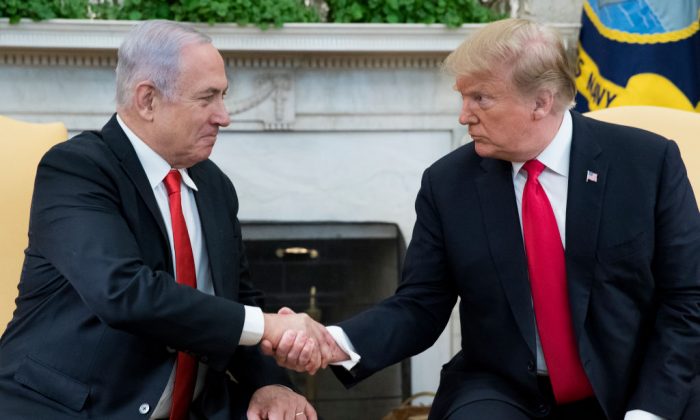GOLAN HEIGHTS–Israel said on April 23 it would name a new community on the Golan Heights after President Donald Trump as an expression of gratitude for his recognition of its claim of sovereignty over the strategic plateau.
Israel captured the Golan from Syria in a 1967 war and annexed it, in a move not recognized internationally. The United States broke with other world powers last month when Trump signed a decree recognizing Israeli sovereignty there.

“All Israelis were deeply moved when President Trump made his historic decision,” Israeli Prime Minister Benjamin Netanyahu said in a video statement made on the Golan.
He added that, after the Jewish Passover festival, he would “bring to the government a resolution calling for a new community on the Golan Heights named after President Donald J. Trump.”
Trump’s Golan move followed his decision in December 2017 to recognize Jerusalem as the Israeli capital, breaking with decades of U.S. policy over the status of a city contested by the Palestinians.
Israel has said separately that, in appreciation of the U.S. president, it intends to name a proposed train station near Jerusalem’s Western Wall after him.
Trump Warns Netanyahu About Growing China-Israel Ties
During their meeting in Washington in late March, President Donald Trump warned Israeli Prime Minister Benjamin Netanyahu that the U.S.–Israeli security relationship could suffer if Israel doesn’t curb its bilateral ties with Beijing, according to an April 14 report by Israeli broadcaster Channel 13, citing several unnamed senior Israeli officials involved in the meeting.
According to the Israeli officials, Trump didn’t threaten the Israeli prime minister with an ultimatum, but instead asked where things stood.
U.S. officials have repeatedly warned Israel about the dangers of working with China. In January, John Bolton, national security adviser to Trump, raised concerns to Netanyahu about Israel using Chinese telecoms equipment in sensitive tech sectors.

Then, on March 21, U.S. Secretary of State Mike Pompeo, in an interview with Channel 13, brought up the security risks of China’s continued investments in Israel, which he said could hamper intelligence sharing and other cooperation between Washington and Jerusalem.
Trump-Netanyahu Meeting
During their March meeting, Trump also expressed concern about Chinese infiltration in Israel, in particular on Chinese infrastructure projects at the Israeli port of Haifa, according to Channel 13. The U.S. side is also concerned about Chinese telecom firms Huawei and ZTE entering tenders to provide Israel’s 5G network infrastructure.
Haifa is a commercial hub that is also home to an Israeli naval base, which regularly hosts joint U.S.-Israeli navy drills.
According to a March 15 article by news site Breaking Israel News, Israel’s Communications Ministry is consulting with the country’s defense establishment before it officially launches the tender.
Harel Menashri, head of the cyber department at the Holon Institute of Technology and a former cyber expert at Israeli security agency Shin Bet, said Israel should wait for how the Five Eyes alliance—Australia, Canada, New Zealand, the UK, and the United States—proceeds before Israel makes a decision on whether to allow Huawei to take part in the country’s 5G tender, according to Breaking Israel News.
So far, Australia and New Zealand have blocked Huawei outright from their 5G plans, citing national security risks, because of Huawei’s close links to Beijing. Meanwhile, the United States has no formal ban but has sought to persuade European allies to block the Chinese firm from their 5G networks.
U.S. officials are still negotiating with Israel about 5G network security. On April 16, Bolton met with members of Israel’s national security team, which included his Israeli counterpart, Meir Ben-Shabbat, in Washington, to discuss U.S.-Israel cooperation on 5G, according to Israeli newspaper The Jerusalem Post.
Bolton wrote a tweet about the meeting: “We reaffirmed long-standing shared security priorities & discussed expanding cooperation to secure 5G networks, cybersecurity, and countering malign actors in the Middle East.”
The unidentified Israeli officials also revealed that Netanyahu would have no problem preventing Chinese companies from competing in tenders for communication infrastructures in Israel, but the Israeli prime minister would be hard-pressed to stop Chinese construction of a new port at Haifa—since work has already begun on the project, according to Channel 13.
Additionally, Netanyahu told unnamed U.S. officials in recent months that the Israeli Cabinet is going to approve a new mechanism to monitor Chinese investment, after two Cabinet meetings held on the subject since the beginning of this year. However, rolling out the mechanism has been delayed due to disputes within the Israeli government, according to the news outlet.
Chinese investment in Israel increased by 1,700 percent between 2012 and 2017, according to a March 24 report in Foreign Policy magazine, citing data from Israeli intelligence. In total, China has invested $700 billion in Israel, about half in the energy sector, followed by $150 billion in tech research and development.
In response to Channel 13’s reports of what happened during the Trump-Netanyahu meeting, the White House didn’t deny the report, and said: “There is no response.” Meanwhile, Netanyahu’s office said: “The report is incorrect.”
Experts have previously brought up the issue of investment screening in Israel. Jacob Nagel, a visiting fellow at the Washington-based Foundation for Defense of Democracies (FDD), urged Israel to establish its own investment reviewing committee by learning from the Committee on Foreign Investment in the United States (CFIUS), in an article published on the think tank’s website in March.
“Israel should ensure that the committee has ultimate authority to cancel deals that pose a threat to Israeli security, even if such a decision might have a deleterious financial impact,” Nagel wrote.
Trump signed the Foreign Investment Risk Review Modernization Act into law in August 2018, which strengthens CFIUS by bringing new transactions, such as ports and real estate near military installations, under its review authority. It also enables the U.S. committee to review and deny deals involving the transfer of minority interests in companies belonging to the critical infrastructure or technology sectors.

